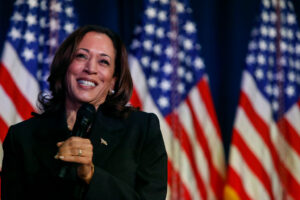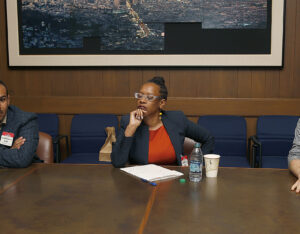The centre of gravity in Democratic politics quaked on Sunday — and in a flash, everything changed. Barring an act of divine intervention, Kamala Harris will become the party’s standard bearer in Chicago in less than a month’s time.
Her ascent, however, signals more than just a nominal shift. In the corridors of Washington DC, it will represent a rapid transfer of power, much of it beyond view, among the operatives, donors and advisors filtering through her presidential campaign.
How Harris will differentiate herself from Joe Biden remains a mystery. It is likely she will run on many of the same policies and accomplishments of his administration, and with the aid of many of the same party organs and supporters. More revealing will be the decisions Harris makes over who she brings into to advise her campaign. As the saying goes, popularised in the Reagan administration and later by senator Elizabeth Warren, “personnel is policy”.
In her ill-fated 2019 bid for the presidency, Harris’s campaign was chaired by her sister, Maya Harris, whose husband, Tony West, is an influential voice in Silicon Valley and a major fundraiser for Democratic politicians. West’s then title at Uber — chief legal officer — belied his outsized role at the company. In the years following the 2020 election, he helped to engineer Uber’s successive political victories over organised labour.
Harris is also in negotiations with Bearstar Strategies, a consultancy firm that is largely unknown in DC but presides over California’s political scene. Known for their cunning use of deep “opposition research” and sensitivity to culture-war issues to market centrist, business-friendly causes and candidates, it was Bearstar strategists who shepherded Harris from her perch as the state’s attorney general to the Senate and her last presidential campaign. And it was Bearstar strategists who, over the past decade, elected a cadre of prominent Democrats in California, while simultaneously advising the state’s largest corporations on political strategy. Until last year, California senator Laphonza Butler also worked for the firm, where she advised Uber on its campaign to avoid classifying drivers as employees. In other words, far from the extreme liberal the Trump campaign is preparing to run against, Harris’s advisors and donors have long embodied a more West Coast style of moderate power politics.
In recent days, GOP campaigns have produced videos clipping Harris’s remarks from her 2019 primary campaign. At the time, she veered far to the Left, pledging support for Medicare for All and the Green New Deal; she even suggested she might consider abolishing the immigration enforcement agency (ICE). But a look at her inner circle reveals few, if any, radicals. A number of Harris’s former closest aides — Yasmin Nelson, Meaghan Lynch, Andy Vargas, Michael Collins, Michael Fuchs and Deanne Millison — have taken jobs in the world of corporate lobbying since parting with her. Indeed, while Harris is keen to feed off the iconography of civil rights marches and activism, Leftists have never held a place at her side in her 20 years in elected office.
Perhaps unsurprisingly her initial campaign recruitment efforts reinforce this trend. Take, for instance, reports that she is attempting to recruit Obama administration alumni Karen Dunn and David Plouffe. Both choices suggest a far more pro-business line than the popular Harris narrative. Plouffe previously advised Uber, while Dunn is the lead lawyer representing Google in its antitrust lawsuit filed by the Biden administration. If hired, they will join Eric Holder, who served as Obama’s attorney general before becoming a corporate advisor at the law-lobbying firm Covington & Burling, and has now been chosen by Harris to vet her potential running mates.
At its core, this is a very Californian way of doing politics. Governor Gavin Newsom — who served alongside Harris in San Francisco when he was mayor and she was district attorney — also owes his election victories to Bearstar. His leadership style bears a striking resemblance to his former colleague: just like Harris, he panders to the Left, but governs largely from the centre. In 2019, in an attempt to mobilise progressive votes in his gubernatorial primary, Newsom promised the moon to the Left, campaigning on single-payer health care and a “Marshall Plan” to build huge tracts of new housing. Once in office, however, both goals fell by the wayside.
Nine years earlier, during her first bid for attorney general, Harris campaigned in a similar fashion: she promised a crackdown on corporate criminals, much to the delight of Left-leaning voters, but enforced the law sparingly once in office. Most contentiously, she eschewed cases against big business, declining to criminally charge financial industry firms such as OneWest Bank, which had been accused of fraudulent foreclosure practices and PG&E, the utility giant that ended up killing eight San Bruno residents with a gas pipeline explosion. As the New York Times later noted, PG&E had retained the services of Harris’s political advisors at a previous iteration of Bearstar Strategies. Elsewhere, Harris’s much-touted environmental justice unit, cast by her as an unprecedented initiative to crackdown on polluters dumping hazardous waste in low-income, racial-minority neighbourhoods, did nothing of the sort. Her office instead prosecuted a few small-time defendants and left major business interests off the hook.
Of course, political campaigns are always filled with lofty policy promises delivered on the stump. But amid all the waffle and misdirection, a leader’s true motivations can still be gleaned from their choice of personnel. Obama famously pledged to get tough on Wall Street’s “culture of greed and scheming” in the wake of the 2008 financial crisis — but his choice of veteran investment bankers to staff his administration correctly signalled that he would never criminally prosecute a single large bank responsible for the meltdown. Likewise, Trump’s most serious hire — the free-trade sceptic Robert Lighthizer — made clear his intention to upturn America’s lumbering trade policy.
As for Biden, the President’s most significant appointment may turn out to be his selection of Lina Khan to chair the Federal Trade Commission. Khan has reinvigorated the once-forgotten federal agency and used it to forge a new path, discouraging scores of corporate mergers, cracking down on private equity and bringing new lawsuits against pharmaceutical firms and tech giants. Yet perhaps even more pivotal was Biden’s decision to select a team of Russia hawks to set his European policy: Jake Sullivan as National Security Advisor and, until recently, Victoria Nuland at the State Department. Their apparent reluctance to negotiate with President Putin could continue to impact America’s global standing long after Biden exits the White House.
Either way, it would be misguided to overlook how America’s winner-takes-all presidential system, coupled with its professionalised form of entertainment-politics, can encourage an unjustified focus on the presidency as a single person. In reality, the role is a team effort of hundreds of managers. The 2.5 million or so civilian employees of the federal government, along with the 2.2 million military personnel, ultimately answer to about 4,000 presidential appointees tasked with carrying out the Oval Office’s agenda. And with each new administration comes the power to replace those 4,000 managers.
Biden’s cabinet is carefully mixed, for better or worse, with progressive and conservative-leaning Democrats — a balance that reflects the President’s preferences as a leader. But Harris is less of a known quality. Faced with this reality, we can only look to her inner circle. There, with its deep ties to Silicon Valley and the business wing of the Democratic Party, the real vision of Harris 2024 starts to emerge.
Disclaimer
Some of the posts we share are controversial and we do not necessarily agree with them in the whole extend. Sometimes we agree with the content or part of it but we do not agree with the narration or language. Nevertheless we find them somehow interesting, valuable and/or informative or we share them, because we strongly believe in freedom of speech, free press and journalism. We strongly encourage you to have a critical approach to all the content, do your own research and analysis to build your own opinion.
We would be glad to have your feedback.
Source: UnHerd Read the original article here: https://unherd.com/



